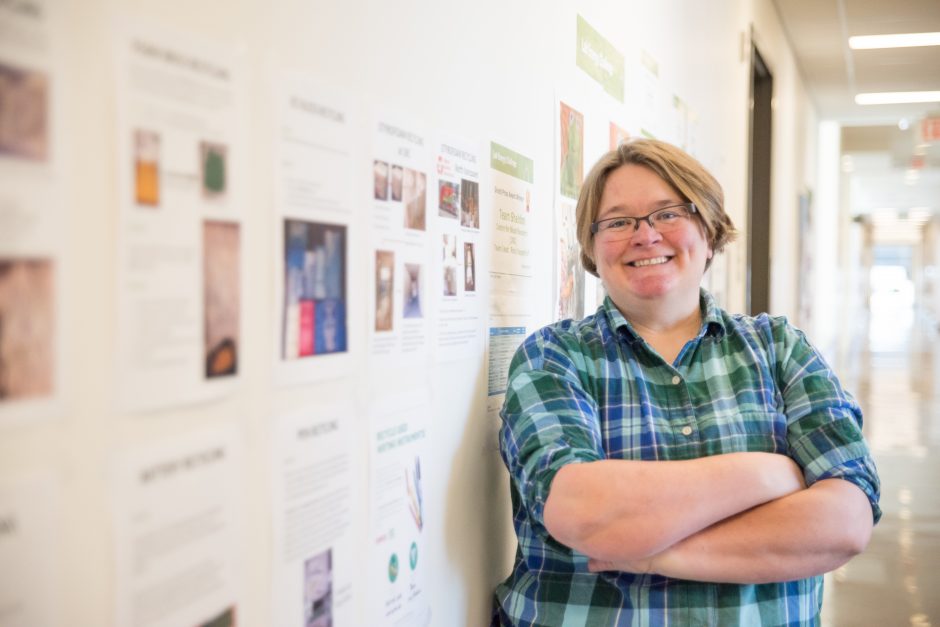When Dr. Reinhild “Reini” Kappelhoff came to UBC as a postdoctoral fellow in 2003, she proactively started looking for ways to make her laboratory more environmentally friendly.
“I was surprised when I found out that there was no battery recycling, and people were not conscious about how to manage their waste,” she recalls.
The lab she worked for as a PhD student in Germany had well established waste management practices, and she was constantly looking for ways to decrease her impact on the environment. That is why Reini immediately joined UBC’s Green Labs Program in 2008, when she first heard about it.
“I was looking for something like that program,” Reini says. “I wanted to do my little bit of saving the planet.”

Dr. Reini Kappelhoff, research associate and lab manager of the Overall Lab, in UBC’s Centre for Blood Research, in front of her “Tips for Recycling” wall. Photo by: Ricardo Seah
UBC’s Green Labs Program is a cooperative effort between Campus and Community Planning, Energy and Water Services, Financial Operations, Safety and Risk Services, UBC Okanagan, and members of the research community. It aims to reduce the impacts of laboratories by engaging with researchers to identify opportunities, promote solutions and provide resources.
Guided by UBC’s action plans on topics like climate change, waste management and water conservation, the program works to build awareness among a community spread across 400 laboratories. This comes with significant challenges since lab buildings consume up to ten times more energy than other types of spaces at the university. They are responsible for 50 per cent of the energy used on campus, 25 per cent of the water used and 95 per cent of the hazardous waste generation.
“UBC aims to be a global leader in sustainability, and ensuring our research operations are as sustainable as possible is an important part of achieving that mission,” says Paul Foote, Green Labs Energy and Water Programs Coordinator. “Green Labs offers a diverse range of programs, initiatives, trainings and incentives for researchers to integrate and innovate more sustainable practices into research activities in line with emerging best practices.”
As a result, the program supports UBC in building a forward-looking, cutting-edge university that is nimble and flexible, which is represented by Catalyst #3 (I am shaping the future of research, teaching and work) in the Focus on People 2025 framework.
“The global green labs movement is growing and UBC aims to be at the leading edge of promoting sustainable lab innovations,” Paul says.
In October 2019, UBC was recognized for its leadership in promoting sustainable procurement by the International Institute for Sustainable Laboratories, a global network of peer institutions. This was the second consecutive year that the university received the award, which is the result of numerous collaborations across departments and faculties, and of the contributions of many of UBC’s sustainability champions.
UBC was also named one of Canada’s Greenest Employers for the eighth consecutive year in 2019. This award recognizes employers that create a culture of environmental awareness, develop exceptional earth-friendly initiatives and are attracting employees because of their environmental leadership.
Creating a network of sustainability champions
Currently a research associate and lab manager of the Overall Lab, in the Centre for Blood Research, Reini is one of the over 130 sustainability coordinators – 40 of which work in labs – that have the mandate of inspiring colleagues to be more sustainable at UBC. The in-lab coordinators are part of a network managed by Green Labs, which provides them with support, resources and training.
Like the other members of the network, Reini has been recognized as a champion at the university for leading sustainability projects in labs and participating in several campus-wide campaigns. For example, in 2016, she coordinated one of the teams that won Green Labs’ Lab Energy Challenge, a competition that invited participants to make sustainable improvements to their labs and conserve energy.
In 2015, she applied for the Green Labs Fund Award, which allowed the Centre for Blood Research to purchase a dishwasher rack for glass pipettes. The equipment helped them reduce their water consumption by a factor of 100– to 180 litres per year from 18,000.
In addition, Reini has contributed to the creation of the Sustainability Leadership Team, a group that works to make the Life Sciences Centre – where the Centre for Blood Research is based – a greener place. One of the results of their work was the creation of the LSC Recycling and Non-hazardous Waste Recyclepedia, an online resource for students, staff and faculty on how to recycle items used in the building.
“Every building works a bit differently, so we brought the sustainability piece from Green Labs, adapted and applied it here,” she explains. “I think most of what we accomplish is just by giving people the right information.”
As a sustainability coordinator, Reini meets with other champions from across the university to exchange best-practices and identify opportunities to reduce impact. The program is open to UBC staff, faculty and graduate students who are passionate about sustainability.
For Paul, the influence of this work extends beyond UBC’s borders, since Green Labs is connected to the international research community exchanging innovations and successes. Furthermore, it supports the professional development of graduate students and postdocs that interact with the program and the network of sustainability champions.
“Sustainable knowledge is more and more demanded in the job market. So we’re helping train researchers to bring sustainable practices across the community and translate this knowledge to industries, corporations, and national research laboratories,” he concludes.
Access the Green Labs website to learn about their latest events and how to get involved. For more information about becoming a Sustainability Coordinator, visit the Sustainability Coordinator Program website.